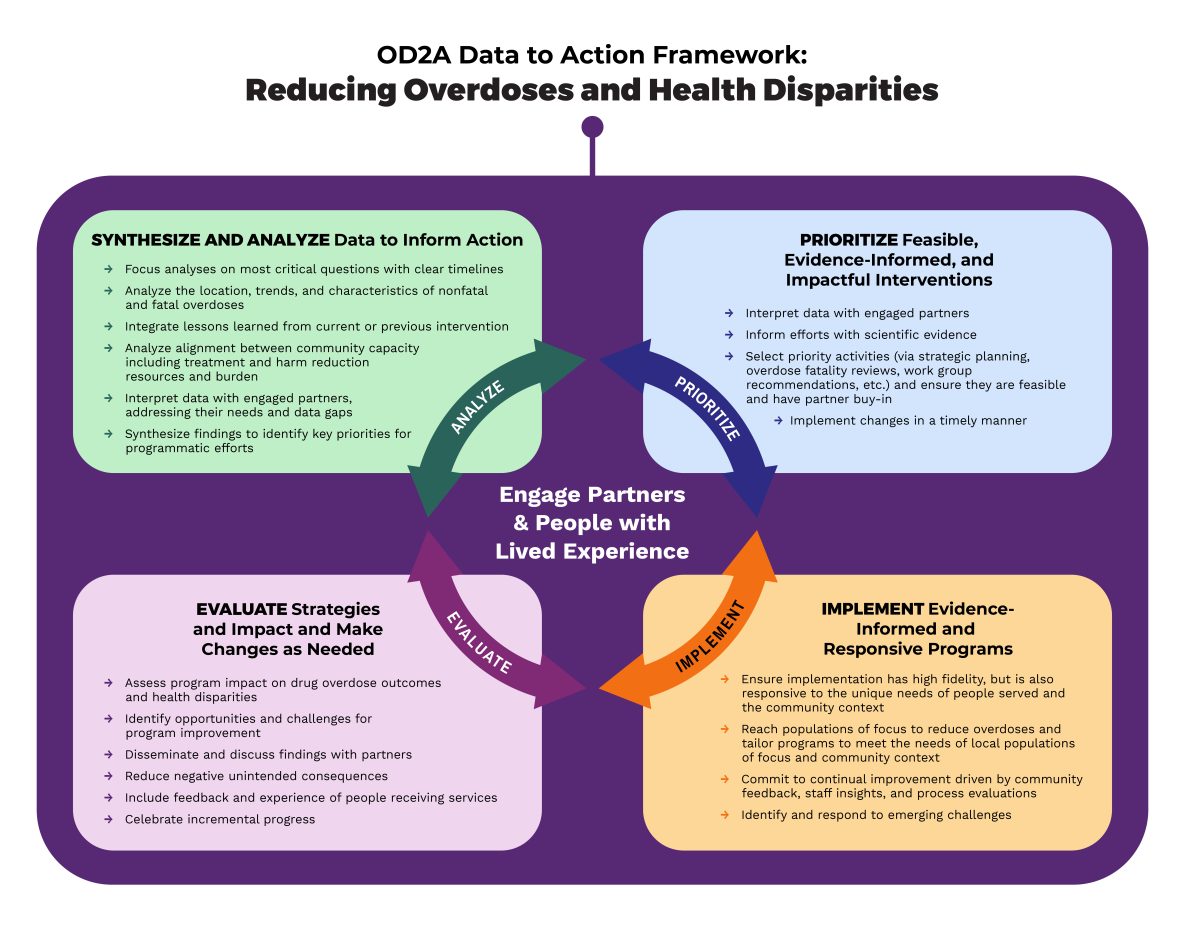About Overdose Data to Action
In the United States, nearly 300 lives are lost to drugs each day. Overdose Data to Action (OD2A) supports jurisdictions in implementing prevention activities and in collecting accurate, comprehensive, and timely data on nonfatal and fatal overdoses and in using those data to enhance programmatic and surveillance efforts. OD2A focuses on understanding and tracking the complex and changing nature of the drug overdose crisis by seamlessly integrating data and prevention strategies.
CDC launched the first multiyear OD2A cooperative agreement in 2019 with 66 recipients (referred to as jurisdictions) comprising state, territorial, county, and city health departments. In August 2023, CDC awarded new five-year cooperative agreements to 90 jurisdictions under two distinct OD2A programs, one designed for states, and one designed specifically for localities and territories.
CDC created OD2A in States and OD2A: LOCAL to:
- Address the evolving epidemiology of the drug overdose crisis.
- Close identified gaps in prevention activities.
- Apply lessons learned from the previous OD2A funding opportunity.
- Reflect the differing roles and spheres of influence state and local health departments and their partners have.
Applying the Overdose Data to Action Framework
OD2A is guided by a data-to-action framework (right). Data to action means using different types of data to select, improve, and scale-up up drug overdose prevention programs and policies. These data include surveillance data, process and outcome evaluation data, and data from partners including those who use drugs or have lived experience with drug use. In addition, jurisdictions explore how they can use data from focus groups, community meetings, or partner interactions to inform or adapt surveillance data collection or analysis.
At the core of this model is a focus on health equity and reducing health disparities by engaging partners and integrating people with lived experience into all components. Funded jurisdictions will be able to respond more quickly, more effectively, and more equitably to their constituents’ needs, using data to drive action steps that reduce overdose deaths and substance use-related harms as fast as possible.
In partnership with CDC, jurisdictions focus on some or all of the following strategies:
Surveillance Strategies
Enhanced surveillance strategies enable jurisdictions to track nonfatal and fatal overdoses involving opioids and/or stimulants, and polysubstance use and identify emerging drug threats:
OD2A in States Surveillance Strategies
OD2A in States Surveillance Strategies
OD2A: LOCAL Surveillance Strategies
OD2A: LOCAL Surveillance Strategies
Required: Surveillance infrastructure
Required: Surveillance infrastructure
Required: Overdose surveillance infrastructure
Required: Overdose surveillance infrastructure
Required: Morbidity surveillance
Required: Morbidity surveillance
Optional and competitive: Toxicologic testing of drug products and/or paraphernalia
Optional and competitive: Toxicologic testing of drug products and/or paraphernalia
Required: Mortality surveillance
Required: Mortality surveillance
Optional and competitive: Surveillance of linkage to and retention in care
Optional and competitive: Surveillance of linkage to and retention in care
Optional and competitive: Biosurveillance
Optional and competitive: Biosurveillance
Optional and competitive: Data Linkage
Optional and competitive: Data Linkage
OD2A in States Surveillance Strategies
Required: Surveillance infrastructure
Required: Morbidity surveillance
Required: Mortality surveillance
Optional and competitive: Biosurveillance
Optional and competitive: Data Linkage
OD2A: LOCAL Surveillance Strategies
Required: Overdose surveillance infrastructure
Optional and competitive: Toxicologic testing of drug products and/or paraphernalia
Optional and competitive: Surveillance of linkage to and retention in care
Prevention Strategies
Evidence-based prevention strategies are aligned with shifts in the overdose crisis, including changes in the illicit drug supply and a rise in stimulant and polysubstance use:
OD2A in States Prevention Strategies
OD2A in States Prevention Strategies
OD2A: LOCAL Prevention Strategies
OD2A: LOCAL Prevention Strategies
Required: Clinician/Health system engagement and health IT/PDMP enhancement
Required: Clinician/Health system engagement and health IT/PDMP enhancement
Required in community, public safety, and healthcare settings: Linkage to and retention in care
Required in community, public safety, and healthcare settings: Linkage to and retention in care
Required: Public safety partnerships/ interventions
Required: Public safety partnerships/ interventions
Required in community, public safety, and healthcare settings: Harm reduction
Required in community, public safety, and healthcare settings: Harm reduction
Required: Harm reduction
Required: Harm reduction
Required in healthcare settings: Clinician and health systems best practices
Required in healthcare settings: Clinician and health systems best practices
Required: Community-based linkage to care
Required: Community-based linkage to care
Optional: Stigma reduction
Optional: Stigma reduction
Optional: Health IT enhancements
Optional: Health IT enhancements


